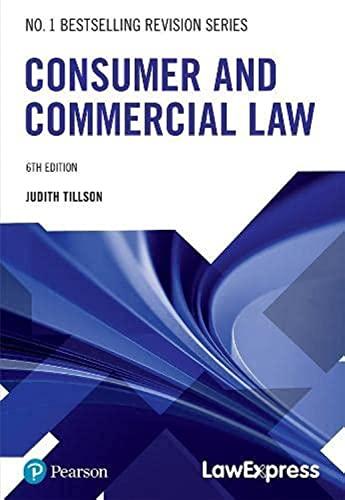Question
Question 1 (2.5 Points) Listen ReadSpeaker webReader: Listen Focus Which of the following debts are not usually discharged by personal bankruptcy? Question 1 options: 1)
Question 1 (2.5 Points)
Listen
ReadSpeaker webReader: Listen
Focus
Which of the following debts are not usually discharged by personal bankruptcy?
Question 1 options:
1)
child support payments
2)
credit card debt
3)
unsecured debt
4)
debt owing to the Canada Revenue Agency
5)
student loan debt
Question 2(1 point)
Listen
ReadSpeaker webReader: Listen
Grundy's employer recently assigned itself into bankruptcy, leaving Grundy unpaid in the amount of $1,800 for back wages. Which category of creditor describes Grundy?
Question 2 options:
1)
secured creditor
2)
preferred creditor
3)
unsecured creditor
Question 3(3 points)
Listen
ReadSpeaker webReader: Listen
Which of the following is/are unsecured creditors in a bankruptcy?
Question 3 options:
1)
a debt owing on a mortgage
2)
a debt owing to the trustee in bankruptcy
3)
a debt owed to the Canada Revenue Agency
4)
a debt owed to Visa
5)
a debt owed by a business to one of its suppliers
6)
a debt owed on a promissory note for a loan to buy a car
Question 4(2 points)
Listen
ReadSpeaker webReader: Listen
Which of the following is/are preferred creditors in a bankruptcy?
Question 4 options:
1)
a debt owed to Revenue Canada
2)
a debt owed to your mortgage company
3)
a debt owed to MasterCard
4)
a debt owed to your trustee in bankruptcy
Question 5(1.5 points)
Listen
ReadSpeaker webReader: Listen
Homer's Venture's Inc goes bankrupt, owing money to the following. Rank these in order, from first priority to last priority.
Question 5 options:
1
2
3
balance owing on a cell phone bill1
2
3
dividends owing to shareholders on preferred shares1
2
3
Balance owing on a security agreement to buy a boat, properly registered at the personal property registry
Question 6(1 point)
Listen
ReadSpeaker webReader: Listen
Which transaction would fall under the Sale of Goods Act?
Question 6 options:
1)
sale of a house
2)
sale of a pallet of wood
3)
sale of stock on the stock market
4)
repairs to a motorcycle
5)
all of the above
Question 7(1 point)
Listen
ReadSpeaker webReader: Listen
Adrien purchased suit online. The online description stated it was made of wool, but in fact it is polyester. According to the Sale of Goods Act, why will the merchant likely have to accept the return of the product?
Question 7 options:
1)
The seller refused the opportunity to compare goods with a sample.
2)
The buyer relied on the description of goods by the seller.
3)
The buyer made the intended use known at the time of purchase.
4)
There is an implied condition that the seller has title to the goods.
Question 8(1 point)
Listen
ReadSpeaker webReader: Listen
EcoGreen Garden Centre Inc. will pay $2400 for the two tons of organic fertilizer it ordered for delivery in March. The fertilizer is to be packaged in 20-kilogram bags and then packed onto two separate one ton pallets for shipment. What rule under sale of goods legislation will dictate when title to the goods passes to EcoGreen?
Question 8 options:
1)
Rule 1 Specific goods not in deliverable state
2)
Rule 2 Specific goods in deliverable state
3)
Rule 3Specific goods that have to be weighed or measured
4)
Rule 4 Specific goods on approval
5)
Rule 5 Unascertained goods
Question 9(1 point)
Listen
ReadSpeaker webReader: Listen
You are buying 3000 chairs for your restaurant, which are currently sitting in the factory. At what point will title to goods pass to you?
Question 9 options:
1)
when you accept the goods
2)
when the goods are unconditionally appropriated to the contract
3)
when the goods are delivered
4)
immediately, because the goods exist
Question 10(1 point)
Listen
ReadSpeaker webReader: Listen
On January 1, Jamie orders a custom-made suit. On February 1, the shop tells her the suit is ready. On March 1, she pays in full. On April 1, the shop burns down, and her suit is destroyed. Which of the following is correct?
Question 10 options:
1)
Since she owned the suit on January 1, this is her problem
2)
Since she owned the suit on February 1, this is her problem
3)
Since she owned the suit on March 1, this is her problem
4)
Since she had not yet picked up the suit, this is not her problem, the shop must refund her money
Step by Step Solution
There are 3 Steps involved in it
Step: 1

Get Instant Access to Expert-Tailored Solutions
See step-by-step solutions with expert insights and AI powered tools for academic success
Step: 2

Step: 3

Ace Your Homework with AI
Get the answers you need in no time with our AI-driven, step-by-step assistance
Get Started


